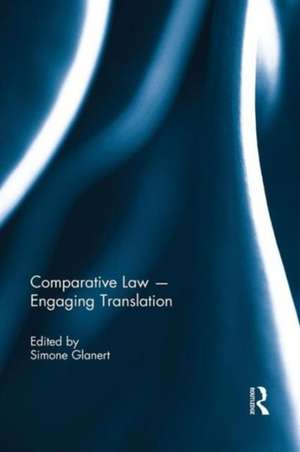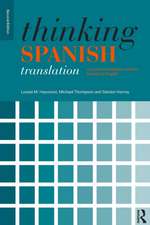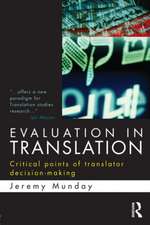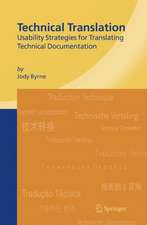Comparative Law - Engaging Translation
Editat de Simone Glanerten Limba Engleză Paperback – 4 sep 2015
| Toate formatele și edițiile | Preț | Express |
|---|---|---|
| Paperback (1) | 410.46 lei 6-8 săpt. | |
| Taylor & Francis – 4 sep 2015 | 410.46 lei 6-8 săpt. | |
| Hardback (1) | 1059.84 lei 6-8 săpt. | |
| Taylor & Francis – 27 iun 2014 | 1059.84 lei 6-8 săpt. |
Preț: 410.46 lei
Nou
Puncte Express: 616
Preț estimativ în valută:
78.55€ • 81.15$ • 65.34£
78.55€ • 81.15$ • 65.34£
Carte tipărită la comandă
Livrare economică 19 martie-02 aprilie
Preluare comenzi: 021 569.72.76
Specificații
ISBN-13: 9781138100268
ISBN-10: 1138100269
Pagini: 236
Ilustrații: 2 black & white illustrations, 4 black & white tables
Dimensiuni: 156 x 234 x 13 mm
Greutate: 0.32 kg
Ediția:1
Editura: Taylor & Francis
Colecția Routledge
Locul publicării:Oxford, United Kingdom
ISBN-10: 1138100269
Pagini: 236
Ilustrații: 2 black & white illustrations, 4 black & white tables
Dimensiuni: 156 x 234 x 13 mm
Greutate: 0.32 kg
Ediția:1
Editura: Taylor & Francis
Colecția Routledge
Locul publicării:Oxford, United Kingdom
Public țintă
PostgraduateCuprins
Notes on Contributors Acknowledgements Chapter 1 Translation Matters Simone Glanert, PART I – ADDRESSING TRANSLATABILITY Chapter 2 Translation as Ethics Alexis Nouss, Chapter 3 Who’s in Control? Translation, Cost and the Origins of Speciation Michael Cronin, Chapter 4 Legal Translation and the Problem of Heteroglossia Kwai Hang Ng, Chapter 5 Catching the Spirit of the Law: From Translation to Co-Drafting Jean-Claude Gémar, PART II – THE SPECIFICITY OF COMPARATIVE LAW Chapter 6 Comparative Law and the (Im)Possibility of Legal Translation Jennifer Hendry, Chapter 7 Legal Translation and the ‘Contamination’ of Comparative Legal Research C.J.W. (Jaap) Baaij, Chapter 8 Translating Civil Law ‘Objectivity’ with an Adversarial Brain: An Ethnographic Perspective Shawn Marie Boyne, Chapter 9 The Powerless Translator: An Argument From Legal ‘Culturemes’ Raluca Bercea, PART III – TRANSLATION BEYOND TRANSLATION Chapter 10 Translating Religious Principles into German Law: Boundaries and Contradictions Pascale Fournier and Régine Tremblay, Chapter 11 Of Friendless and Stained Men: Grafting Medieval Sanctions Onto Modern Democratic Law Luca Follis, Chapter 12 Abuse of Tax Law as a Language of Morality in Modern Times: A Comparative Analysis of France, Canada and Ireland Bénédicte Sage-Fuller and Ferdinand Prinz zur Lippe, Chapter 13 Withholding Translation Pierre Legrand, Index
Descriere
In an era marked by processes of economic and political integration that are arguably unprecedented in their range and impact, the translation of law has assumed a new significance. Can legal rules carry identical normative implications in more than one language? Can law achieve uniformity despite needing to be rendered in many languages? How do interpreting and translation affect adjudication in a multilingual courtroom? To what extent can a given legal text make sense in a different legal culture? These questions, among others, are addressed here within a comparative legal context in which, it is demonstrated, translation issues are a central feature of the contemporary legal landscape.








